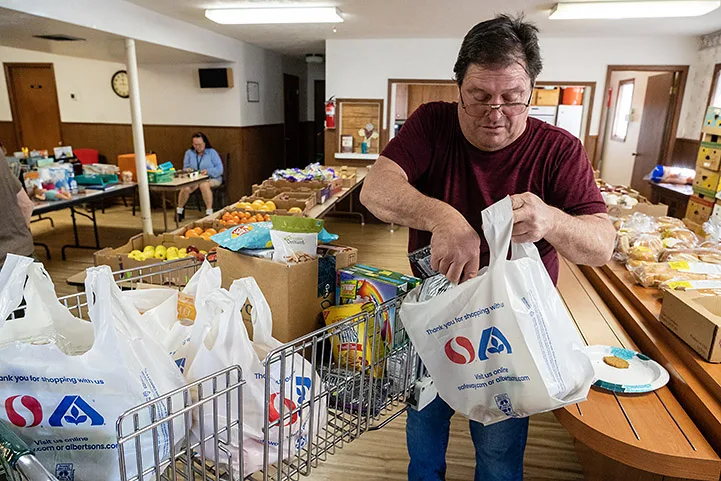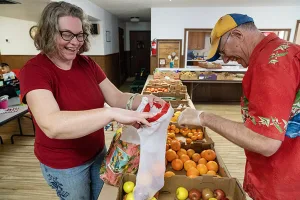Pantries Provide Relief Through Difficult Times

Ray shops for food at Dallas Seventh-day Adventist Church’s food pantry, which he relies on for relief as food prices remain high.
When a vital resource for emergency food assistance came to an end earlier this year, many neighbors living on the margins began having a much harder time putting food on the table.
In early 2020, Supplemental Nutrition Assistance Program (SNAP) participants began receiving a boost to their regular food benefits. About one in six Oregonians participate in the SNAP program, and the added benefits – part of a federal initiative to offset the economic impacts of the pandemic – went a long way toward ensuring people facing food insecurity had enough to eat. Those emergency allotments came to an end in February, resulting in about a 40% overall reduction in food benefits for the average Oregon family[1].
As a result, many people turned to pantries for help. In March, Marion Polk Food Share’s partner pantries served a record number of guests – more than any month during the height of the pandemic. The drastic increase in need is apparent at pantries like one at Dallas’ Seventh-day Adventist Church, where weekly food distributions are drawing many more neighbors seeking relief.
For Suzanne, a Dallas resident who has been coming to the pantry for several months, the cut to her SNAP benefits means she can’t get sufficient food at the grocery store. Suzanne utilized the pantry before benefits were reduced, but the change means she now comes in more frequently to supplement what she’s able to purchase at the store.
“It’s really impacted me. I run out of food, and weekly this [pantry] is what saves us,” she says. “I don’t know how I would make it without it.”
The loss of added food benefits comes at a time when the extraordinarily high cost of food, housing, utilities and other essentials are straining household budgets.

Lorraine, left, shops for produce with help from volunteer Tim at the Dallas Seventh-day Adventist church food pantry.
As he fills his cart with groceries on a regular visit to the pantry, Ray – who is unable to work due to health issues – reflects on how food from the pantry provides relief from the hardships of inflation.
“It’s been tough. I go to [the grocery store] and spend my last $300 for the month on stuff that doesn’t even get us by,” he says.
He and his wife, a teacher, live with their three daughters and a granddaughter. Between his disability payments and his wife’s salary, they’re barely making it by. Being able to rely on the pantry makes a big difference for their family.
“We do whatever we can to make a lot out of a little,” Ray says. “Without this, it’d be detrimental. It’d be really difficult.”
Like Ray and Suzanne, many neighbors throughout Marion and Polk counties are relying on pantries with greater regularity. In March, the Food Share’s network of public pantries saw visits increase by 32 percent over the first two months of the year. Pantry volunteers are regularly seeing new faces, and regular clients are visiting more often to make ends meet.
Lorraine is among the guests at the Dallas Seventh-Day Adventist pantry who also relies on nearby Dallas Food Bank for help. She has noticed the increase in traffic at both pantries in recent months.
“It seems like everybody’s in the same spot where times are hard, inflation’s gone up, the cost of food has gone up,” Lorraine says.
Although she’s careful about not accepting more than what she thinks is her fair share, Lorraine and her husband are in a difficult financial situation and are grateful for the assistance they receive at both pantries to provide for themselves and their three children.
“We’ve been so blessed to have this and the other food bank, it’s kept our family alive,” she says. “It provides for our family, we’re able to get what we need and we’re not hungry. It’s a blessing.”

